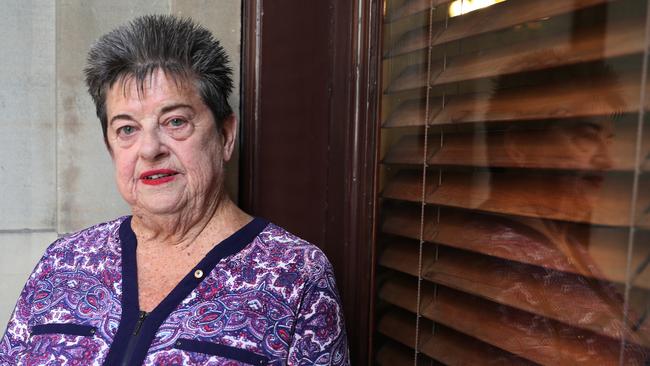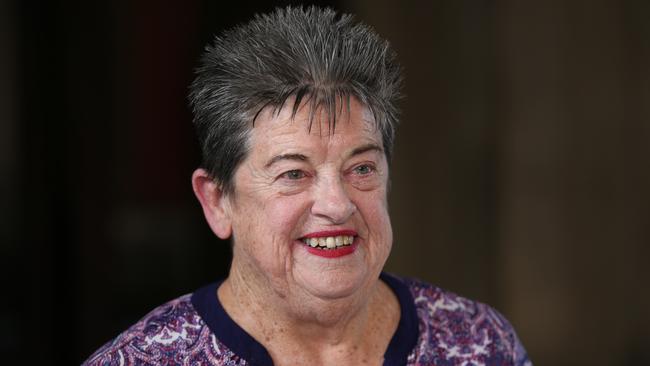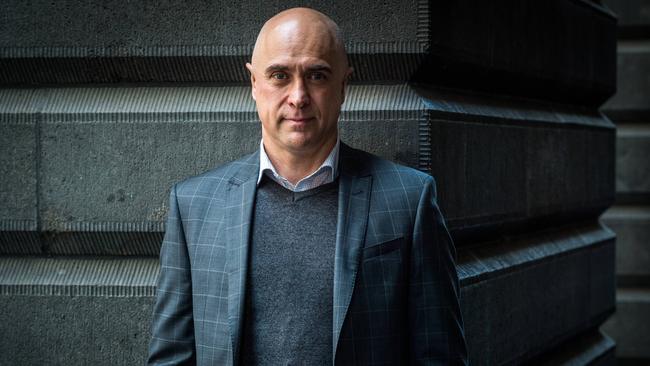Mental Health Royal Commission hears ‘monsters’ preyed on people institutionalised with mental illness
Janet Meagher was institutionalised for a decade, in which time she said people with mental illness were abused and their cries for help ignored. She’s speaking up now.

VIC News
Don't miss out on the headlines from VIC News. Followed categories will be added to My News.
A woman institutionalised for a decade has told of “monsters” who preyed on people with mental illness, and that victims’ cries for help were ignored.
Mental health advocate Janet Meagher was “a guest of Her Majesty” at a Sydney institution from 1969 to 1979, after being diagnosed with paranoid schizophrenia.
In powerful testimony on the second day of the mental health royal commission’s public hearings, Ms Meagher said sexual, physical and emotional abuse at the hands of staff was commonplace.

“There were wonderful, committed and marvellous, humane staff there,” she said.
“There were, parallel to that, monsters who were in the guise of nursing professionals.
“After I left I did a quick survey of people I knew who had been through, and I only ever met one who said they hadn’t been sexually abused.”
She added: “There were staff who you just had to know they were on duty to know that one of you was going that night.”
Ms Meagher said the abuse in turn made her more violent, a response to the “brazenness of people who claim they are health professionals”.
“Because we were not competent before the law, no one would listen to what was happening,” she said.
‘DEPERSONALISED AND HUMILIATED’
Now one of Australia’s most prominent mental health advocates, Ms Meagher began her fight for fairer treatment by arming herself with “weaponry” — the Mental Health Act and other codes of practice.
Initially dismissed by some as “a mad person”, she said some improvements had been made to the system.
But she said people with mental illness were simply surviving, not thriving.
Ms Meagher told the commission that people with mental illness, and their loved ones, needed more control over their own care, and services that extended beyond offering medication.
Mental health advocate Janet Meagher has today told the @RCMentalHealth of “monsters†who stalked the halls of the Sydney institution she was placed in from 1969-1979. “I am begging you not for another report, I beg you for a change†#RCMentalHealth pic.twitter.com/8HhQ5yJjmT
— Monique Hore (@moniquehore) July 3, 2019
“We are often depersonalised and humiliated and denigrated by the very fact that we have a mental illness and, secondly, by the nature of the services that are offered to us,” she said.
“Depersonalisation is such a common mechanism to just get things done according to policy.
“We saw the Nazis do it, we see us doing it now with immigration and things like that: we call something a name and then we don’t have to face the humanity of it.”
She later added: “The trouble in mental health services is that you are the mood disorder person in room eight, you are the bipolar one, you are the schizophrenic one, you are the depressed one, and ‘what’s-your-name’ ”
STOPPING STIGMA
AFL legend Wayne Schwass and former federal minister Andrew Robb yesterday fronted the commission to share their personal experience’s with mental illness.
Today’s hearings, at Melbourne Town Hall, are targeting the stigma surrounding mental illness.
SANE Australia’s deputy chief executive Dr Michelle Blanchard will appear, along with University of Melbourne academics Associate Professor Nicola Reavley and Dr Chris Groot.
SUICIDE, SUPPORT TO TOP MENTAL HEALTH INQUIRY
THE ‘INCREDIBLE FRUSTRATION’ OF MENTAL HEALTH BRICKWALLS
Having not been asked directly about stigma — and having “stewed” on what she would say overnight — Ms Meagher used the end of her testimony to target the “weasel word” she hates with a vengeance.
“I use ‘discrimination’, and unapologetically,” she said.
“It’s intolerable to permit or excuse verbal or social exclusion or vilification for those of us who experience mental health issues, but we do.”
The most recent national survey on mental health stigma, from 2011, found almost half of people would not want a person with schizophrenia marrying into their family.
More than a quarter would not want an in-law with depression.

A/Professor Reavley said research had also shown that mental health awareness campaigns had unintentionally increased fears that people with mental illnesses such as schizophrenia were dangerous.
“If you’ve given the message that it’s not really a person’s fault it’s not in their control, possibly the corollary of that is that people might be seen as out of control and therefore more dangerous,” she said.
“I think for us this highlights the need to be really careful about the messages that these types of campaigns and interventions send so you’re not unwittingly doing harm and increasing the negative attitudes in some ways.”


